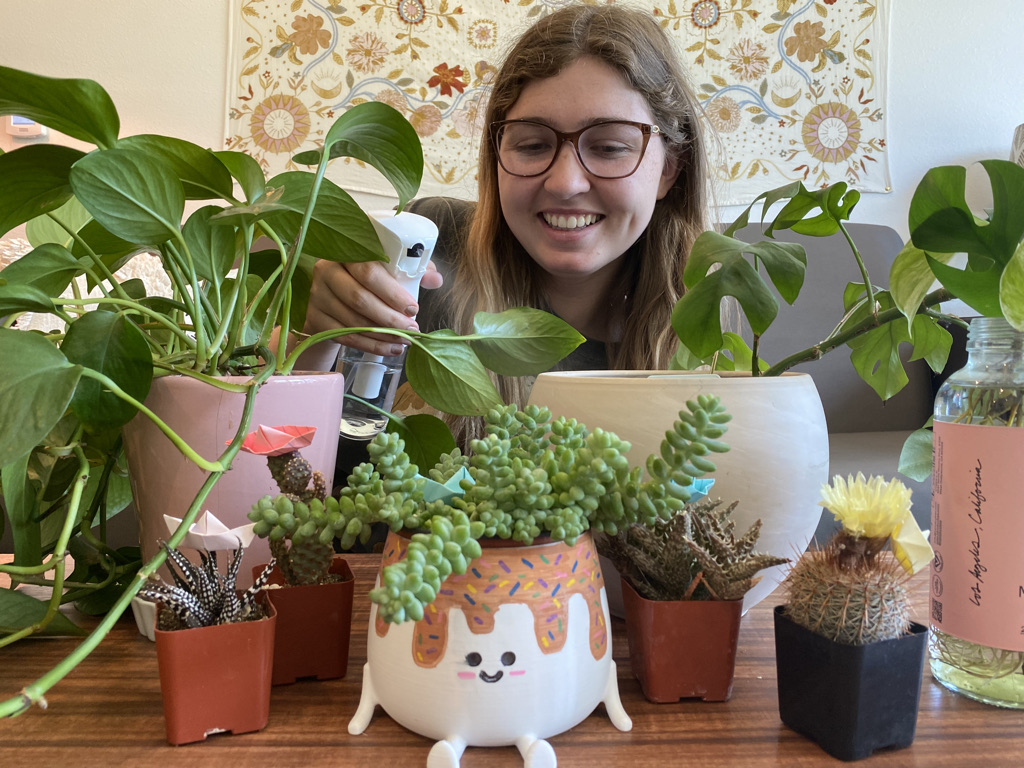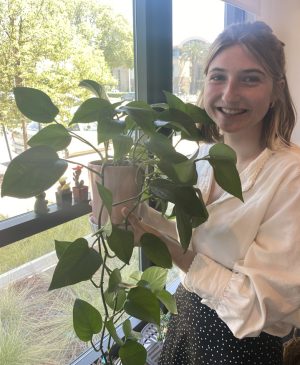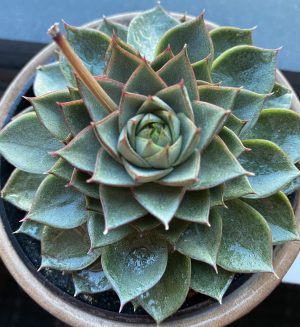
Beginning as a tiny sprout, it soon begins to blossom its abundant foliage with just a little bit of love and care. As it grows, so does the joy and happiness of its owner.

But like most things in life, that change isn’t instantaneous.
It takes time.
Every day sophomore Olivia Chilvers spends part of her day nurturing her plant, whom she dubbed “Xavier.” But owning that plant is not just a decoration or even a hobby for her. It’s an escape.
Students have all kinds of reasons for turning to plants these days, even though most buy them as a decoration or a hobby at the start. Still, many of them eventually noticed a positive change in their mental health after living with their plants.
“It brings new life into my life,” Chilvers said. “I get to watch Xavier grow and it makes me look forward to each and every day.”
After suffering through a difficult time this past year when her mother died, Chilvers couldn’t see a way through the agonizing grief she feels. But, after getting her plant and helping it grow, she has experienced an improvement in her mental health.

“There is value to even a small amount of interaction with nature,” said Chapman University psychology professor, Marina Kahana. “Taking care of the plants, looking at the plants, all that is really great. I would absolutely say you should have plants.”
According to a study published in the National Library of Medicine, 85% of the average person’s life is spent indoors in modern society. To combat this, studies on the effects of having plants inside have been done that found having indoor plants can reduce psychological and physiological stress.
Kahana supported this statement with research she had on the effects of being in nature.
“Scientists recommend an hour to an hour and a half minimum of being outside every day,” she said. “It reduces stress hormones and it improves your mood.”
Many students noted they experienced these benefits.
“I found myself feeling happier since I would see my work and care go into a plant and see it grow,” Chilvers said.

One student noted it occasionally helped with anxiety.
“It definitely had a calming effect,” said senior broadcast journalism major, Luca Evans.
Sophomore Zetta Whiting noticed a similar effect.
“I have really bad anxiety that schoolwork definitely contributes to, so it’s nice to have a plant in my workspace that I know I have taken good care of,” said the English journalism major. “It makes me happy to look over at my window and see my plant vibing and thriving in the sun.”
Like Whiting, sophomore Maggie Vetter noted that taking care of her plants made her feel good.
“It’s nice to have something to care for aside from myself,” said the screenwriting major.
According to Kahana, taking care of something such as a plant can give people a confidence boost when they are able to keep it alive.
“They definitely feel a little bit of a sense of responsibility. That can be a good thing,” Kahana said.
One student felt that sense himself.

“It did make me feel more adulty at times and that’s always valuable for a college student,” Evans said.
However, while students experience many positive effects of being plant owners, most noted the drawback of their plants dying.
“Not gonna lie, if they die, that would be heartbreaking,” Whiting said.
Evans experienced this firsthand.
“My plants died,” he said. “They are hard to take care of. I’m a college student, so it’s really hard to keep a watering schedule because classes are all over the place.”
While Vetter agreed the struggle to keep a plant alive can be more of a hindrance than a comfort, she thinks that plants for the most part have a positive effect on her mental health.
“The bright colors of plants are a big plus since I love to have warm colors inside to make me feel better and calmer,” she said. “I love nature, so it just feels more welcoming to have plants in my space and to bring a bit of nature inside.”

But while bringing nature inside does have a positive effect on a person’s mental well-being, it is not a replacement for the need to be outside.
“I don’t want people to think that having a plant on your desk is a replacement for being out in nature,” said Kahana. “I really think it’s important to emphasize not just having a plant in your dorm, but to encourage the use of that plant as a way of helping you connect with the natural world.”
As it continues to do for Chilvers.
“I didn’t realize it at first, but having a plant has made me feel better since it is something I can regularly take care of,” she said. “The happiness it brings me makes me want to go outside and live my life to the fullest.”


Sydney Scott is a sophomore studying journalism and data analytics. When she isn’t writing, you can find her reading various books, discovering hidden places, or riding her favorite attractions at Disneyland.
Sydney Scott is a sophomore studying journalism and data analytics. When she isn't writing, you can find her reading various books, discovering hidden places, or riding her favorite attractions at Disneyland.
